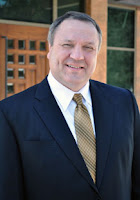The Changing Nature of Christian College Presidents?
 Recently news came in that Concordia University - St. Paul (my alma mater, class of '83) has a new president: the Rev. Tom Ries. Although a graduate of the seminary his passion seems to lie as much with financial management as with theology. His post-graduate education involves a MBA from the University of Minnesota, along with an almost earned Ph.D, the emphasis being finances in higher education. After a time with the LCMS Foundation as president, CSP recruited Ries as its own 9th president in its 118 year history. I have never had the privilege of serving on a search committee for a college, university or seminary, so my knowledge of the criteria used to choose a president is next to zero. However, looking back at the various presidents of the institutions where I have studied, I wonder if the criteria is changing. When I was in college the president was a former chaplain and two-star general in the U.S. Army. Other successors, as I recall, were credentialed scholars and professors in the Synod. This latest candidate seems to have been chosen for his expertise in fund-raising, as I suspect many presidents may now be selected as well. Raising money for institutions of higher education, especially in the Synod, has changed. Gone are the days when one could expect a check from headquarters, funded by the goodwill offerings of rank and file members from the Synod's churches. While they retain a connection with the mother church, the financial tethers have long since disappeared. Thus, I suspect that search committees now look for a master of fund-raising to keep the dollars flowing from the endless variety of donors.
Recently news came in that Concordia University - St. Paul (my alma mater, class of '83) has a new president: the Rev. Tom Ries. Although a graduate of the seminary his passion seems to lie as much with financial management as with theology. His post-graduate education involves a MBA from the University of Minnesota, along with an almost earned Ph.D, the emphasis being finances in higher education. After a time with the LCMS Foundation as president, CSP recruited Ries as its own 9th president in its 118 year history. I have never had the privilege of serving on a search committee for a college, university or seminary, so my knowledge of the criteria used to choose a president is next to zero. However, looking back at the various presidents of the institutions where I have studied, I wonder if the criteria is changing. When I was in college the president was a former chaplain and two-star general in the U.S. Army. Other successors, as I recall, were credentialed scholars and professors in the Synod. This latest candidate seems to have been chosen for his expertise in fund-raising, as I suspect many presidents may now be selected as well. Raising money for institutions of higher education, especially in the Synod, has changed. Gone are the days when one could expect a check from headquarters, funded by the goodwill offerings of rank and file members from the Synod's churches. While they retain a connection with the mother church, the financial tethers have long since disappeared. Thus, I suspect that search committees now look for a master of fund-raising to keep the dollars flowing from the endless variety of donors.This was probably inevitable. Still, as one views the selection of these future leaders, one wonders how much time is spent evaluating the candidate's theological insights and views, considering whether that candidate best represents the institution's goals in service to the Synod. Recently Concordia Theological Seminary - Ft. Wayne chose a new president as well. The Rev. Dr. Lawrence Rast certainly brings impeccable credentials as a theologian. Maybe things are different with seminaries as opposed to the universities. Yet should they be? We prepare our future teachers and other professional church workers at these institutions, so we have a stake in their theological maturity. Why should a president here be any less of a leader in the teaching of the faith than at a seminary. I have nothing against the Rev. Ries. Nevertheless, he does not impress me as a theologian. His service to the college has been in administrative and financial roles. Likewise was his service to the church-at-large. When talking about his church experience the main things touted was the tremendous growth his congregation experienced. Then again, his pastor-mentor was the Rev. Dr. Guido Merkens, one of the early mega-church pastors.
I have not examined the other Concordias to see what different directions may be afoot, but I do wonder. My fear, though, is that with faculty charged with the instruction of our future church leaders, we need leaders prepared to hold them to account and supportive of the Synod's overall theology. I pray that Ries can be such a man for his own time.



Comments